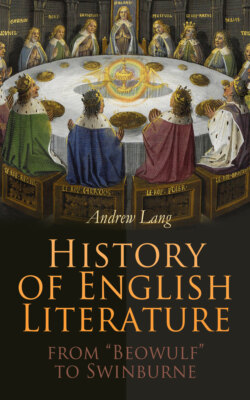Читать книгу History of English Literature from "Beowulf" to Swinburne - Andrew Lang, Robert Kirk - Страница 28
На сайте Литреса книга снята с продажи.
The Monks and Learning.
ОглавлениеThe "Anglo-Saxon Chronicle," running from Alfred's day to King Stephen's, and thus surviving the Norman Conquest, is the earliest historical writing in English prose. As we have seen, it was the work of the monks, regular soldiers of learning, living together under strict rules. On the other hand the secular clergy, parish priests and others, were the irregular levies against ignorance. The monks were fallen on evil times for learning and literature.
During the long cruel wars against the Danish raiders and settlers (900-960) many monasteries were overthrown; others, like Abingdon, became poor neglected places; into others the kings and nobles placed their younger children, to live comfortably on the rents and revenues of the Church, and neglect prayer and books. Under Eadwig the Fair, St. Dunstan (born 925) appeared as a reformer, making the rule of the Church respected, and being therefore at feud with Eadwig, as Thomas à Becket was with Henry II. Under Edgar (957-975), peace was restored, and Dunstan could carry out reforms as Archbishop of Canterbury. He brought back from Flanders the new rule-of the Order of St. Benedict (which the monk in Chaucer despises as not up to date) for the strict living of monks, and was backed by Bishops Oswald and Æthelwald, men of learning and reformers of education.
New monasteries, which often had schools attached to them, were built, and old monasteries were restored. Dunstan was an artist (a picture of him as a monk is still preserved, and is said to have been drawn by himself). He was skilled in music and metalworking, and fond of the old Anglo-Saxon poetry. He has left no books of his own writing, but there are curious early Lives of him in Latin. As a boy he climbed in his sleep to the roof of a church; he used to see visions of people at the time of their deaths; a large stone is said to have flown at him of its own accord; and, before his death, his bed, with him in it, was slowly raised up in air, and softly let down again. According to these tales, Dunstan must have been a "medium"; there is nothing saintly in such prodigies. Like many people of genius who were not saints, he was of a visionary nature, though a thoroughly practical and energetic man.
Thus he, with Oswald, Bishop of Worcester, later Archbishop of York; Abbo; Æthelwold; Byrthferth; and others, introduced "regulars"—Benedictine monks—in place of married priests into the cathedrals, and encouraged schools and learning of all kinds. Æthelwold himself taught Latin to boys at Winchester, and had the Latin book of the rules of the Benedictine monks done into Anglo-Saxon. A set of Anglo-Saxon sermons survives from this age called "The Blickling Homilies" (from Blickling, a house of Lord Lothian, where the manuscript has been preserved). Homilies are simple statements of Scriptural facts for simple hearers. The preacher already addresses the congregation as "my dearest brethren" (mine gebrothra tha leofostan). "Bethlehem," says the preacher, "means being interpreted, the House of Bread, and in it was Christ, the true bread, brought forth." "The Divine nature is not mingled with the human nature, nor is there any separation: we might explain this to you by a little comparison, if it were not too lowly; see an egg, the white is not mixed with the yolk, yet it is one egg." The sermons (these quoted are by Ælfric) are all plain teaching for plain people, but there is a famous address by Bishop Wulfstan, encouraging the English, by Biblical examples of Hebrew fighting patriots, to defend themselves against the cruel heathen Danes (1014).
